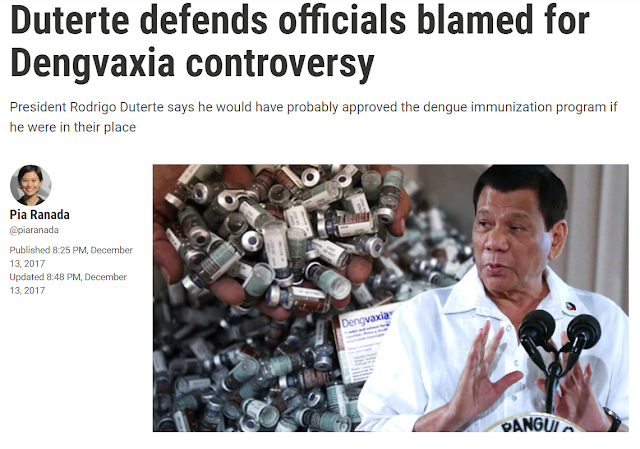President Duterte, Acting On Good Faith Is Not Enough
Pia Ranada may be critical of President Duterte, but this is only apparent if the criticism favors people from the previous administration. Last December, Duterte's opinion on Dengvaxia was welcomed with open arms. When it comes to misdeeds of the Aquino administration, Duterte's favorable opinions are not questioned eventhough these are grossly mistaken. After all, Duterte saying that the purchase of Dengvaxia and its mass vaccination program were only "done in good faith" greatly helps the image of Rappler's idols. The problem is, "good faith" is not a good measure for public trust. It is always easy to claim that someone acts with good intention. And it is difficult to argue with that. For this reason, trust should not be solely based on "good faith". There are two more important elements: loyalty and due diligence. Loyalty can only be ascertained with no conflicts of interest and due diligence is based on evidence.
Although Dengvaxia costs several billions of pesos and affects hundreds of thousands of children, there is another program that came from the Aquino administration with similar if not much larger scope. It is the the current basic education program or DepEd's K to 12. In this case, it should be clear why "good intentions" are not enough. Conflicts of interest abound in this program if one simply goes through the members of the steering committee and other bodies responsible for drawing this new curriculum. At one point, I even witnessed a member of the steering committee, who currently holds an administrative position in a private university, offering to review what is proposed. That is several layers of conflicts. Yet, the program pushes through. The lack of evidence backing the design and implementation of the new curriculum is also largely evident. The fact that the government knows very well that it cannot support the new curriculum but still decides to continue is an excellent example of when due diligence is absent.
The mass media in the Philippines should do better if they want to play the role of improving governance in the Philippines. Otherwise, all they do is to lower expectations. An example is shown below:
Apparently, eighty percent of companies, according to a survey, are not inclined to hire K-12 graduates. A headline like this may not be that bad, if mass media were not touting years ago that K-12 will allow graduates to gain employment easily. There headline should first say, "We lied: K-12 graduates are not readily employable."
 |
| Above copied from Rappler |
Although Dengvaxia costs several billions of pesos and affects hundreds of thousands of children, there is another program that came from the Aquino administration with similar if not much larger scope. It is the the current basic education program or DepEd's K to 12. In this case, it should be clear why "good intentions" are not enough. Conflicts of interest abound in this program if one simply goes through the members of the steering committee and other bodies responsible for drawing this new curriculum. At one point, I even witnessed a member of the steering committee, who currently holds an administrative position in a private university, offering to review what is proposed. That is several layers of conflicts. Yet, the program pushes through. The lack of evidence backing the design and implementation of the new curriculum is also largely evident. The fact that the government knows very well that it cannot support the new curriculum but still decides to continue is an excellent example of when due diligence is absent.
The mass media in the Philippines should do better if they want to play the role of improving governance in the Philippines. Otherwise, all they do is to lower expectations. An example is shown below:
 |
| Above copied from ABS-CBN |
Apparently, eighty percent of companies, according to a survey, are not inclined to hire K-12 graduates. A headline like this may not be that bad, if mass media were not touting years ago that K-12 will allow graduates to gain employment easily. There headline should first say, "We lied: K-12 graduates are not readily employable."
Comments
Post a Comment